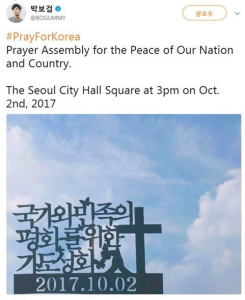 By now, pretty much everyone is aware of the controversy surrounding Park Bo-gum and his church — arguably cult — the Jesus Centered Church. Park Bo-gum has stirred the ire of fans in both Korea and internationally after promoting a prayer assembly organized by the Jesus Centered Church. Park, for his part, denies that it is a cult, claiming to be a “regular Christian” and “disappointed” by all the furor. So, what’s the problem then? After all, as many have argued, isn’t he entitled to his religious beliefs
By now, pretty much everyone is aware of the controversy surrounding Park Bo-gum and his church — arguably cult — the Jesus Centered Church. Park Bo-gum has stirred the ire of fans in both Korea and internationally after promoting a prayer assembly organized by the Jesus Centered Church. Park, for his part, denies that it is a cult, claiming to be a “regular Christian” and “disappointed” by all the furor. So, what’s the problem then? After all, as many have argued, isn’t he entitled to his religious beliefs
However, people aren’t actually angry at Park Bo-gum for having a religion. On the contrary, they’re angry at him for promoting a cult. There are two differences here, the first being individual belief versus public promotion, and the other being a religion versus a cult. Putting aside for now the question of whether the Jesus Centered Church is a cult, there is the issue of priorities.
In a culture where celebrities are expected to work hard, be thankful for the opportunities they have been given, and make sacrifices for the sake of their careers, Park Bo-gum’s seeming decision to prioritize the Jesus Centered Church over the feelings of the public — especially when they appear right now to be in direct opposition — is like a slap to the face. Many feel like Bo-gum is showing that he no longer cares about his career as an actor, and his influence as an idol. Considering his refusal to bow to public pressure and remove the photo, many fans feel that he has spurned the people and the career that has given him so much. Following too soon on the heels of the presidential cult scandal, it’s an especially grating insult for the public.
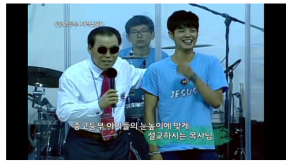 Then there is the public promotion; many have drawn parallels between Tom Cruise’s Scientology promotion and Park Bo-gum’s advertisement of the Jesus Centered Church. While Park maintains that he is just following his religion, his fans expected that his SNS would be used to communicate with them rather than promote alleged cult events. Undoubtedly as an idol, Park has a wide audience, composed of a number of young and impressionable fans. Equally undoubtedly was his purpose; to introduce more potential followers to the event hosted by his church, and therefore, to the church itself. Whether or not the church is a cult, Park Bo-gum directly influenced fans to attend the church’s event.
Then there is the public promotion; many have drawn parallels between Tom Cruise’s Scientology promotion and Park Bo-gum’s advertisement of the Jesus Centered Church. While Park maintains that he is just following his religion, his fans expected that his SNS would be used to communicate with them rather than promote alleged cult events. Undoubtedly as an idol, Park has a wide audience, composed of a number of young and impressionable fans. Equally undoubtedly was his purpose; to introduce more potential followers to the event hosted by his church, and therefore, to the church itself. Whether or not the church is a cult, Park Bo-gum directly influenced fans to attend the church’s event.
What is a cult? A cult can be defined as a system of religious beliefs, but more than that, it is a system of religious belief which is normally regarded as unorthodox and often rejected by government and other recognised religious bodies. There are a number of signs to recognise cults, and people should be extremely way of the following:
- a leader who insists they have special powers or divinity
- addiction-like obsessions with leaders (usually singular rather than a team)
- going outside of scripture, separation from recognised religion, crossing recognised religious boundaries (e.g. personal ownership)
- rejection of critical thinking
- significant pressure; to join, influence and recruit others, donate money and to remain
- deliberate recruitment of vulnerable people
- deception in recruiting and publicising of the cult, followed by seminars on belief & thought reprogramming (brainwashing)
- a closed group with a selective inner circle (sometimes requiring financial membership) which is secretive and closed to outsiders
- exploitation in a number of ways- financial, sexual, emotional,, psychological, physical (e.g. unpaid labour)
- prioritisation of the cult above all, including family and friends
- not just discouragement from leaving but isolation and sometimes even abuse, including from members of the cult, including family
 Cults are considered extremely harmful as they put members’ social, emotional, financial and physical health at risk for an individual’s power gain. They methodically and deliberately remove members’ social connections to family, friends and community so they feel isolated and helpless without the cult. They put at risk any vulnerable people and dependants, such as children. Victims are brainwashed so that they don’t see the risk factors and are cut off from any allies they may have who could resist the influence of the cult. Cults destroy lives.
Cults are considered extremely harmful as they put members’ social, emotional, financial and physical health at risk for an individual’s power gain. They methodically and deliberately remove members’ social connections to family, friends and community so they feel isolated and helpless without the cult. They put at risk any vulnerable people and dependants, such as children. Victims are brainwashed so that they don’t see the risk factors and are cut off from any allies they may have who could resist the influence of the cult. Cults destroy lives.
Some consider Korea to be vulnerable to cults due to a number of factors; after Japan’s invasion of Korea and the Korean war, people were desperate for salvation, solutions and a promise of hope. A number of cults sprang up in so called “traumatic” periods, with the idea of “all the answers” to problems no doubt being very appealing. The idea of Korea gaining special favour from God speaks to the national pride of many Koreans. Additionally, some suggest shamanism as a traditional spiritual practice may leave Koreans more open to varied beliefs about mysticism. Further complicating the mix is the combination of a less individual, more communal group-focus, rigid ideas of status and social hierarchies which fit the cult structure and expected deference towards elders, meaning it is especially difficult for vulnerable younger Koreans to reject claims made by older so-called pastors.
As to the cult question, there are a number of red flags raised by the Jesus Centered Church. Firstly, it’s worth noting that the Jesus Centered Church is rather widely considered to be a cult, including by the Churches in Korea. But the largest two concerns, and by far the biggest red flags, are the supposed healing miracles that the Jesus Centered Church claims to deliver and the idea that Lee Cho-seok can talk to the devil. In order to heal those afflicted by “the devil” and deliver a miracle, there first has to be an afflicted victim. These are often the vulnerable — historically those who are outcast, have physical, mental or social differences, or those such as children who cannot defend against accusations. When believers become more radical, we see more extreme cases of torment. In 2012, in Boseong, three children were found dead, with police alleging their father, a pastor, beat and starved them to death to “exorcise demons”.
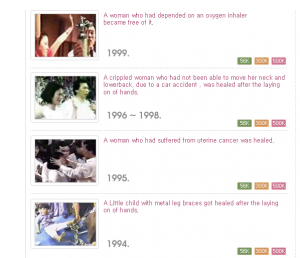 Then there is the healing. These supposedly miraculous events include the curing of cancer, curing a “crippled” woman unable to move her neck and lower back, the curing of a child’s leg, and supposedly, enabling a woman who previously needed an oxygen tank to be mysteriously free of it. The promotion of false remedies and healing is extremely dangerous, as it often leads those who are ill to refuse genuine medical treatment in favor of faith healing. In terminal cases, this is of course followed by death. These claims again take advantage of vulnerable people who are already at a low point in their life, often with serious, sometimes terminal illnesses. It’s a deliberate and calculated attempt to gain easy followers desperate to believe, and willing to throw money and power behind a leader to make miracles happen.
Then there is the healing. These supposedly miraculous events include the curing of cancer, curing a “crippled” woman unable to move her neck and lower back, the curing of a child’s leg, and supposedly, enabling a woman who previously needed an oxygen tank to be mysteriously free of it. The promotion of false remedies and healing is extremely dangerous, as it often leads those who are ill to refuse genuine medical treatment in favor of faith healing. In terminal cases, this is of course followed by death. These claims again take advantage of vulnerable people who are already at a low point in their life, often with serious, sometimes terminal illnesses. It’s a deliberate and calculated attempt to gain easy followers desperate to believe, and willing to throw money and power behind a leader to make miracles happen.
This is distasteful enough on its own, but again it is especially harmful when children and minors become involved. If parents and guardians believe in spiritual medicine, the child has no legal power to protect themselves. Internationally, a number of children continue to die every year from so-called “faith healing” at the expense of contemporary medical treatment, such as the case of the Pennsylvania couple charged for refusing to seek medical treatment for their child this year. Worse still, as in the case of the exorcisms, sometimes the treatment itself can be the cause of death, such as the Boseong case.
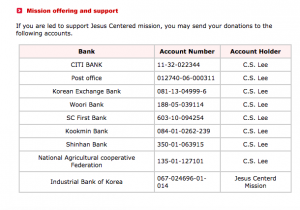 Another red flag, found on the website of the Jesus Centered Church, is the prioritization of Lee Cho-seok as the focal point. While Park has brought the church fame, Lee Cho-seok’s name is the only one to be found… and found repeatedly. Rather than a team, this church seems to be a one man show, which has cult warning signs of rallying around a single leader who is often said to have divine powers. It’s also worth noting that 8 of the 9 bank accounts listed for donations on their website are in Lee Cho-seok’s name, with only one in the name of the Jesus Centered Church. Cults tend to exploit their members, usually financially, through tithes, free labour, costs to advance to the “next level” (such as in Scientology) and in some cases, applying for state grants and tax exemption from the government. The fact that so many accounts are in Lee’s name personally instead of the Jesus Centered Church’s should have people wondering.
Another red flag, found on the website of the Jesus Centered Church, is the prioritization of Lee Cho-seok as the focal point. While Park has brought the church fame, Lee Cho-seok’s name is the only one to be found… and found repeatedly. Rather than a team, this church seems to be a one man show, which has cult warning signs of rallying around a single leader who is often said to have divine powers. It’s also worth noting that 8 of the 9 bank accounts listed for donations on their website are in Lee Cho-seok’s name, with only one in the name of the Jesus Centered Church. Cults tend to exploit their members, usually financially, through tithes, free labour, costs to advance to the “next level” (such as in Scientology) and in some cases, applying for state grants and tax exemption from the government. The fact that so many accounts are in Lee’s name personally instead of the Jesus Centered Church’s should have people wondering.
Then there is the issue of Park’s age and vulnerability to the Jesus Centered Church. Pastor Lee Cho-seok gave Park his name, and is credited by Park as having healed him miraculously at a young age. His father spoke up about fearing Park was dying as a baby, describing him as “like a corpse”. Where doctors were supposedly “negative”, his pastor insisted his father discharge him from hospital and engage in prayer. According to his father, Park made a miraculous recovery. This all sounds marvellous, until you consider what would have happened if Park Bo-gum, then a helpless sick child treated only with prayer, had actually suffered immensely and then died. Further more, Park’s father isn’t exactly a trustworthy figure; his father previously cosigned Park’s name to an 300 million won business loan as a minor which his father then defaulted on. This lead to Park’s bankruptcy scandal and Park had to go to court (now for 800 million won due to interest), ending up having to pay 30 million won, over $25,000 USD. (This also raises questions of where that money went.)
Clearly Park’s family is entrenched in the Jesus Centered Church, and Park has grown up in its shadow. Young children do not have the same capacity for critical thinking as adults, and are therefore vulnerable to cult and/or religious brainwashing. Not only does Park have to watch out for the “family” feel of an inner circle, but also the heavy involvement of his biological family. If indeed he has been brainwashed, it has likely been from birth, and from the people who have been close to him, whom he has trusted his whole life.
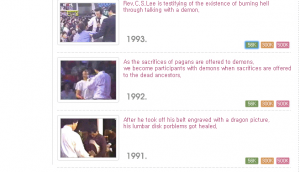 Overall, it’s saddening, but not surprising to see Park Bo-gum either ignoring these warning signs, or genuinely ignorant as to why the public are so alarmed and opposed to his promotion of the Jesus Centered Church. While he is of course, entitled to his religion, it is a legitimate concern to see a public figure actively promoting practices such as faith healing through his religion, which are demonstrably harmful. It seems unlikely that Park will leave his church; it will be interesting to see whether the public will forgive and forget, or whether Park’s career will suffer for it.
Overall, it’s saddening, but not surprising to see Park Bo-gum either ignoring these warning signs, or genuinely ignorant as to why the public are so alarmed and opposed to his promotion of the Jesus Centered Church. While he is of course, entitled to his religion, it is a legitimate concern to see a public figure actively promoting practices such as faith healing through his religion, which are demonstrably harmful. It seems unlikely that Park will leave his church; it will be interesting to see whether the public will forgive and forget, or whether Park’s career will suffer for it.
(CBS News, Korea Herald, The Korea Times, Chosun [1] [2], Jesus Centered Church, Insight, Nate, Joins News, The Diplomat, The Atlantic, Today Online, Merriam Webster, Xenu, Dispatch, IKorea Daily)


